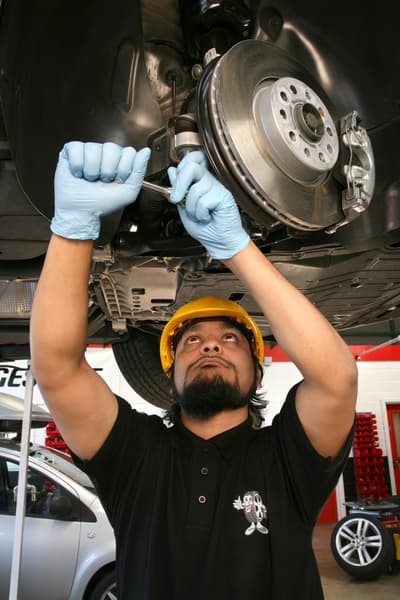What are Anti-Lock Braking Systems?
ABS (Anti-lock braking system) is a system fitted to a vehicle to prevent the wheels locking up whilst braking thereby maintaining steering control for the driver.
The ABS system is made up four of parts:
- Speed sensors - monitor the speed at which the wheels rotate.
- Valves - control the amount of pressure on the brakes.
- Pump - administer pressure on the brake drums or callipers as required.
- Controller - the ECU (electronic control unit) is the control system within a car, the ABS sensors send signals to the ECU to instruct it when to pump the brakes.

How does the Anti-Lock Braking System work?
ABS sensors are fitted to each wheel; the sensors detect when the wheels are skidding or when they stop moving. The ABS pumps the brakes to give the driver steering control. The sensors activate when the brake pedal is being pushed and skidding or locking is detected. The ABS then kicks in and pumps the brakes.
How do I activate the ABS?
To activate your cars ABS you simply brake and steer. Be careful not to take your foot off the brake pedal, or pump during an abrupt stop, the car needs to come to a complete standstill to engage the anti-locking system.
Does ABS help me shorten stopping distances?
ABS is not intended to stop cars any quicker, although in good conditions stopping distances may be shortened. The purpose of an ABS system is for motorists to maintain control of the car when in hard braking situations.
Types of ABS
There are three types of anti-lock braking systems:
- Four-channel/four-sensor – pulses only on the affected wheel when braking
- Three-channel/three-sensor – two ABS sensors fitted to the front and one fitted to the rear, the singular one at the back affects both rear brakes when braking.
- One-channel/one-sensor – commonly used on trucks this type is a rear anti-lock brake with a single sensor.
ABS warning light
If the ABS light illuminates on your dashboard, your brakes haven’t failed but the ABS assistance is no longer available when braking hard and will need to be checked by a professional.
What causes ABS to fail?
ABS can fail when the sensor wiring is impaired or one or more of the wheel sensors become damaged from debris off the road and wheels. Brake fluid may become contaminated causing the hydraulic control unit to fail.
However, a full diagnostic check will clearly identify the faults accurately and here at National we have an excellent diagnostic kit at each of our branches, so we should have the ability to resolve 99% of any ABS issues.
Did you enjoy this blog post? |4 people found this review helpful



 Sign up for SPECIAL OFFERS
Sign up for SPECIAL OFFERS
